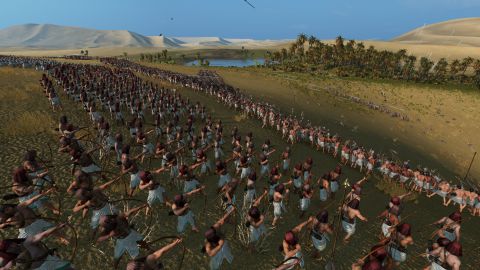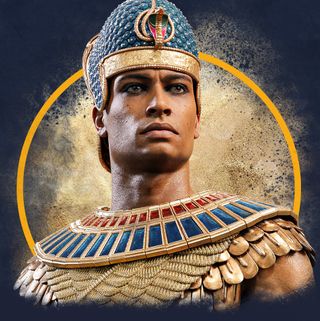Windows Central Verdict
Total War: Pharaoh introduces a number of great new systems and mechanics for the long-running strategy franchise, and there's plenty of fun to be had staving off an ancient apocalypse, but a large number of bugs bring down the experience.
Pros
- +
Fun gameplay that embodies Bronze Age warfare
- +
Quality new mechanics around trade and diplomacy
- +
Good visual and audio design
Cons
- -
A large amount of bugs
- -
User interface issues
Why you can trust Windows Central
War is a constant of human history, and perhaps no franchise embodies that notion quite like Total War.
Total War: Pharaoh transports players to the lush riverbeds and scorching deserts of Bronze Age Egypt, where dark clouds are gathering, and invaders are waiting to pick at the corpse of the once-mighty kingdom of Egypt. Players can choose to revel in the carnage as a Hittite or Canaanite leader, or they can try to endure and attain the title of Pharaoh as an Egyptian faction.
This game introduces a number of improvements to gameplay both on the campaign map and in battles, changes that breathe new life into the well-established Total War formula. Unfortunately, it's also plagued with a number of bugs. These don't ruin the experience, but they do make it more annoying than it should be overall.
Disclaimer: This review was made possible by a review code provided by Sega. The publisher did not see the contents of this review before publishing.
What is Total War: Pharaoh?
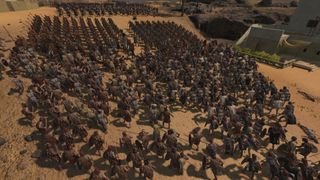
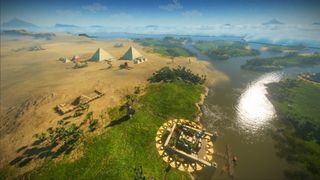
Developer: Creative Assembly Sofia
Publisher: Sega
Genre: Turn-based & real-time strategy
Playtime: 25+ hours
Platforms: Windows PC
Reviewed on: Windows PC
Install size: 40.61 GB
Xbox Game Pass: No
Price: $60
Release date: Oct. 11, 2023
Total War: Pharaoh is a grand strategy game developed by the Creative Assembly's Sofia studio. It's also the latest mainline historical title in the long-running series, with the last historical game being 2019's Total War: Three Kingdoms. While that game still played around with flowery mythical elements, there's no sweeping embellishments or playing into grandiose larger-than-life history here.
Total War games are traditionally divided between the turn-based grand strategy sections and the real-time tactical battles, and there's no breaking the cycle here. Total War: Pharaoh is set just before the Bronze Age Collapse, with players tasked with conquering new territory and defending existing lands, engaging in trade and diplomacy with other factions, and dealing in court intrigue.
Total War: Pharaoh is $60 on Windows PC and is launching on Oct. 11, 2023. Meanwhile a Mac port is being developed by Feral Interactive and will be available at some point in the future.
Total War: Pharaoh — Gameplay and customization
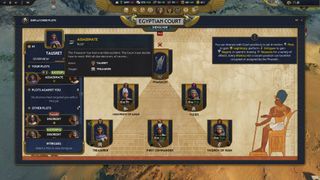
With eight leaders to choose from — there are four Egyptians, two Hittites, and two Canaanites — there's a wide range of possible strategies for carving out your bastion in the Levant. Sometimes that means open warfare, but sometimes more subtle methods are required.
One of the big features in Total War: Pharaoh is the court intrigue system, where players can choose to take a special position, like the Treasurer of Egypt. Each position has its own benefits and rewards, but by interacting with other members of the court and gaining favor, you can get access to their rewards for a limited time.
As an example, while I found it useful to make Tausret the Treasurer early on, by cozying up to the Vizier, I had access to the Assassination scheme, allowing me to potentially kill off some rivals who were becoming way too powerful. This eventually meant I was able to open the court spot for the Viceroy of Kush, grabbing the position for myself and taking advantage of the flow of gold it provided.
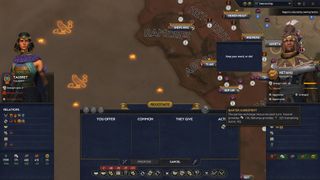
That ties into your approach for diplomacy, which has also gotten a big boost in this game. Building a Bronze Age kingdom that can last means shoring up defenses and ensuring you've got enough resources, and different provinces offer different rewards for building up your settlements. Buildings can require stone and wood, while units always require food. More elite recruits can take bronze and gold in order to maintain them, meaning having a steady flow of every resource is extremely tricky.
If you find yourself suddenly lacking something, you can cut deals to trade with other factions. Some might have an overabundance of one resource while they desperately need another. Early on, I was able to vastly expand my army by trading for food I didn't have with my surplus of stone, and this new way of sweetening deals made me approach diplomacy in a way I've never had to before.
There are some bugs present right now though. While the game is supposed to warn you if an enemy faction has become another party's vassal (and thus, you'll have to go to war with their parent state or seek peace), there were a couple of times where this didn't happen. This left me perplexed as to why I suddenly had an unreliable rating — which affects your trustworthiness and the value of deals you can make — only to realize it was due to something that happened a few turns ago.
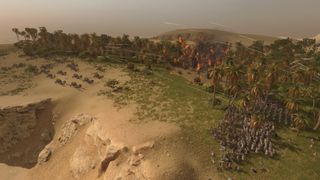
At its heart, this is still Total War, and that means engaging in fierce battles. Like I outlined in my preview, combat here is a war of attrition thanks to the new armor system, which means units won't immediately fall to storms of arrows and punishing charging as long as they've got enough armor. Once that armor is worn down, the fight goes from playing out slowly to happening super-quickly, and wrapping your head around this change is key to attaining victory in combat.
You can also use the dynamic weather to your advantage. At one point, I was clearly outmatched due to my numerically-superior foe having a plethora of skilled archers. By waiting until a sandstorm rolled through, which made the archers inaccurate and unable to shoot as far, my veteran swordsmen were able to close the distance and destroy my enemy unit by unit.
Unfortunately, these fun battles are also where I encountered a number of technical issues. Pathfinding is hard in strategy games and Total War: Pharaoh is hardly the first time I've seen some weird things happen in this series. Sometimes, units react in truly bizarre ways, with archers shifting back and forth instead of responding, or other troops ignored your queued movement commands. It's by far the game's biggest issue, sometimes messing up a strategy so badly I had to restart the fight.
Total War: Pharaoh — Visuals and audio
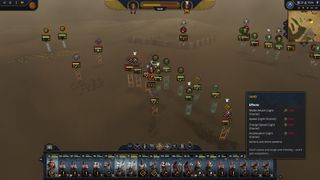
While it's not as visually distinct as some past titles, especially the fantasy-laden Total War: Warhammer games, Total War: Pharaoh looks great. The rich, fertile lands along the shores of the Nile in Lower Egypt are teeming with plant life, while the blazing deserts of Upper Egypt are enough to get you dehydrated just watching your troops burn in the heat.
Similarly, the soundtrack and audio design aren't the highlight of the series, but both sound good, with pleasant music that aids the mood as you overview your burgeoning fiefdoms. Units give feedback through yells of frustration or triumph as battles play out, letting you know when some of your troops are wavering if your attention is currently elsewhere.
Total War: Pharaoh — Accessibility and approachability
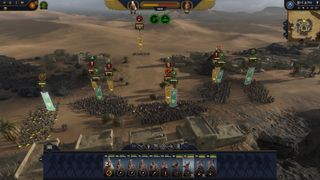
Total War: Pharaoh includes a couple of accessibility options for players to customize their playthroughs. There are colorblindness settings that can be tweaked in order to accommodate common forms of colorblindness, as well UI scaling options that can keep tiny font details from being hard to read.
There's also an impressive number of campaign customization options that make Total War: Pharaoh extremely approachable for series newcomers. Almost every aspect of the campaign can be made more challenging or far easier outside of standard AI difficulty levels. If you want to cap the number of factions that can be involved in a civil war, randomize starting positions, or simply begin with far more resources, you can do that.
I really appreciate being able to tweak things to this depth, and it makes it far easier to recommend Total War: Pharaoh as an entry point if someone likes the concept of strategy games but is hesitant regarding the complexity.
Total War: Pharaoh — Final thoughts
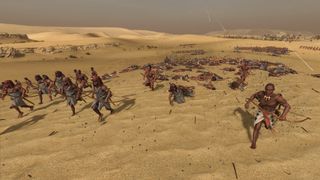
There's definitely room for improvement in this Bronze Age epic. Unit pathfinding needs work, as do some of the UI elements that aren't functioning properly. These issues pop up enough to be annoying in a playthrough, but it's still a game that strategy fans will enjoy playing.
Overall, Total War: Pharaoh is a worthy addition to this oft-underpraised series. The new systems of diplomacy and embodying ancient tradition are fun, and I can see myself spending dozens of more hours leading various Egyptian, Hittite, and Canaanite conquerors to victory.

Samuel Tolbert is a freelance writer covering gaming news, previews, reviews, interviews and different aspects of the gaming industry, specifically focusing on Xbox and PC gaming on Windows Central. You can find him on Twitter @SamuelTolbert.
